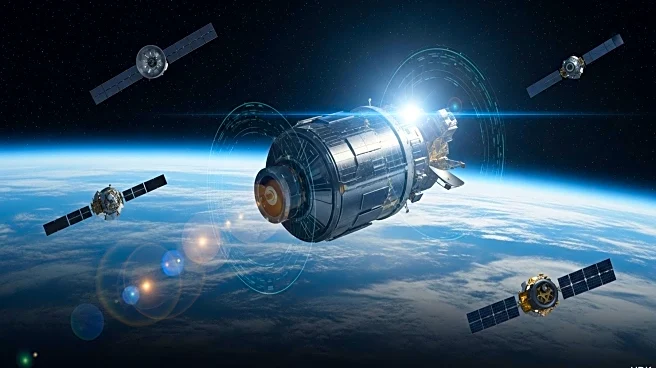What's Happening?
Amazon is intensifying its efforts in the satellite internet market with its Project Kuiper, aiming to compete with SpaceX's Starlink. Recently, Amazon secured its first contract to provide in-flight WiFi services to JetBlue, marking a significant step in its satellite internet ambitions. Despite this progress, Amazon's Kuiper constellation currently has only 102 satellites in orbit, a stark contrast to SpaceX's Starlink, which boasts 8,393 satellites. The Federal Communications Commission requires Amazon to deploy 1,600 satellites by July 2026, with a target of 3,236 by July 2029. SpaceX has already launched 100 Falcon 9 missions, with 72 carrying Starlink satellites, showcasing its substantial lead in the market.
Why It's Important?
The satellite internet market is becoming increasingly competitive, with Amazon's entry posing a challenge to SpaceX's dominance. This development is crucial as it could lead to improved internet access for remote and underserved regions, potentially benefiting 2.5 billion people globally who currently lack internet connectivity. The competition between Amazon and SpaceX may drive innovation and lower costs, making satellite internet more accessible. Additionally, the expansion of satellite internet services is expected to play a significant role in the future rollout of 6G communications, further emphasizing the importance of this technological race.
What's Next?
Amazon plans to continue expanding its satellite network, with additional launches scheduled to meet FCC requirements. The company aims to provide customer services by late 2025, leveraging partnerships with various launch providers, including United Launch Alliance and ArianeSpace. Meanwhile, SpaceX is not resting on its laurels, having recently agreed to a $17 billion deal to acquire Echostar's wireless spectrum licenses, enhancing its 5G capabilities. As both companies advance their satellite internet projects, the market is likely to see increased competition and innovation, potentially reshaping global internet access.
Beyond the Headlines
The satellite internet race between Amazon and SpaceX highlights broader implications for global connectivity and technological advancement. As these companies deploy more satellites, there are potential concerns regarding space debris and the environmental impact of increased satellite launches. Additionally, the competition may influence regulatory policies and international cooperation in space exploration and communication technologies. The ethical considerations of providing internet access to remote regions, including issues of privacy and data security, also warrant attention as the satellite internet market evolves.









